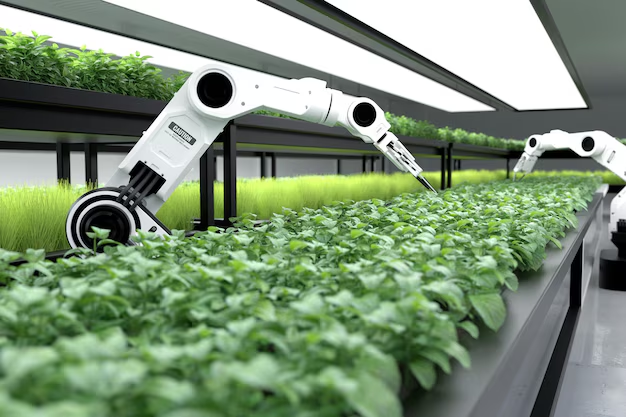
Introduction:
The agricultural industry, traditionally reliant on manual labor, is undergoing a profound transformation thanks to the rapid advancement of robotics and artificial intelligence (AI). With global challenges such as climate change, population growth, and labor shortages, the adoption of agricultural robots is proving to be a game-changer. These robots are streamlining farming processes, improving productivity, and ensuring sustainability in a way that was once unimaginable.
As farmers around the world face pressures to increase crop yields, reduce resource consumption, and enhance the quality of their products, agriculture robots are emerging as powerful tools. From autonomous tractors to harvesting robots and crop monitoring drones, the capabilities of these machines are continuously expanding. Moreover, leading companies are leveraging the potential of these robots to address one of the most pressing concerns in agriculture today: sustainability.
In this article, we will explore the leading companies that are revolutionizing the agriculture robots market, with a particular focus on how they are reducing waste and carbon footprints while driving sustainability in the farming sector.
Sustainability through Agriculture Robots: How Leading Companies Are Reducing Waste and Carbon Footprints
Agriculture has long been one of the largest contributors to global greenhouse gas emissions and environmental degradation. Fertilizer and pesticide overuse, excessive water consumption, and soil depletion are just some of the many environmental issues faced by modern farming. With the introduction of robotics in agriculture, the industry is on the cusp of a significant sustainability transformation.
Agriculture robots have the ability to optimize resource use, minimize waste, and reduce carbon footprints across multiple facets of farming operations. By integrating AI, data analytics, and machine learning, these robots can work with precision, applying water, nutrients, and pesticides only when and where they are needed. This reduces waste, conserves valuable resources, and lowers emissions associated with conventional farming practices.
The following leading companies are at the forefront of the agriculture robotics revolution, helping the industry become more sustainable while enhancing productivity.
1. John Deere
John Deere, a household name in the agricultural equipment industry, has been at the forefront of adopting robotics and AI technology to enhance farming efficiency and sustainability. Through their cutting-edge autonomous tractors, John Deere is helping farmers reduce fuel consumption and emissions while boosting productivity.
John Deere's autonomous machines, including the highly advanced autonomous tractors and harvesters, help optimize field operations such as plowing, planting, and harvesting. By automating these tasks, John Deere allows farmers to reduce fuel usage, minimize labor costs, and lower their overall carbon footprint. Furthermore, John Deere’s advanced data analytics systems enable farmers to apply fertilizers and pesticides with precision, ensuring that these resources are used efficiently, thus reducing waste and environmental impact.
2. Trimble
Trimble is a global leader in precision agriculture technology, offering a range of robotics solutions aimed at improving farm productivity and sustainability. Their agricultural robots, combined with GPS and IoT (Internet of Things) technologies, provide farmers with real-time insights to manage their land efficiently and sustainably.
Download FREE Sample of Internet of Things Market
Trimble's autonomous vehicles, for example, use GPS technology to operate with high precision, enabling them to apply fertilizers, pesticides, and water to crops in exact quantities. This reduces waste and minimizes the environmental impact of overuse. By adopting Trimble's solutions, farmers can improve soil health, conserve water, and reduce chemical runoff, thereby supporting sustainable farming practices that lower carbon footprints.
3. Naio Technologies
Naio Technologies is a French robotics company that specializes in developing autonomous robots for organic farming. Their robots, such as the Oz and Dino, are designed to perform key tasks like weeding, planting, and monitoring crops in a sustainable and environmentally friendly manner.
Naio’s robots are equipped with advanced sensors and AI algorithms that allow them to identify and target weeds with precision, reducing the need for chemical herbicides. This not only minimizes the use of harmful chemicals but also helps preserve biodiversity in agricultural ecosystems. By automating manual labor-intensive tasks, Naio’s robots also reduce fuel consumption and lower overall carbon emissions, making farming operations more eco-friendly.
4. Agrobot
Agrobot, a leading innovator in agricultural robotics, has developed a robot called the Agrobot Sweeper, designed specifically for harvesting strawberries. The company’s robots are equipped with advanced computer vision systems that enable them to detect ripe fruit and pick it without damaging the plants.
By automating the harvesting process, Agrobot helps reduce food waste, as the robots are capable of efficiently harvesting strawberries at the perfect time. The company’s robots also operate autonomously, minimizing the need for labor and reducing fuel consumption associated with traditional harvesting methods. Agrobot's precision in harvesting ensures that crops are picked sustainably, reducing the carbon footprint of this critical stage in the agricultural supply chain.
5. Octinion
Octinion is a Belgian robotics company that has developed the Rubion robot, an autonomous strawberry-picking robot. The Rubion robot is designed to harvest strawberries with precision, reducing the need for human labor in the picking process. This helps improve labor efficiency and reduce the environmental impact of farming operations.
The Rubion robot’s innovative technology includes AI-driven vision systems that allow the robot to identify ripe strawberries and harvest them gently, avoiding damage to the plant and the fruit. This reduces food waste and ensures that fewer strawberries are left behind on the farm. By automating the harvesting process, Octinion is helping reduce carbon emissions and energy consumption associated with traditional harvesting methods.
6. FFRobotics
FFRobotics has developed a highly efficient robotic system for harvesting fruit, specifically focusing on citrus fruits such as oranges. Their robotic harvesters use advanced vision systems and AI to identify and pick fruit with high precision. This innovation is crucial for reducing waste in fruit harvesting, as the robots are able to selectively pick only the ripe fruit, ensuring that less fruit goes to waste.
In addition to reducing food waste, FFRobotics’ machines help reduce labor costs and fuel consumption associated with traditional manual harvesting methods. By increasing the speed and efficiency of harvesting operations, FFRobotics is helping farmers become more sustainable by reducing the overall carbon footprint of citrus farming.
7. Ripe Robotics
Ripe Robotics, an Australian-based company, is pioneering the development of robots for harvesting fruit, particularly in the stone fruit sector. Their robot, the RipeBot, is designed to work autonomously in orchards, identifying and picking fruit with great care and precision. This reduces the risk of damaging the fruit and minimizes waste.
The RipeBot’s efficiency helps reduce the labor costs associated with traditional manual harvesting while lowering fuel consumption and emissions related to farming equipment. By providing farmers with a sustainable alternative to manual labor, Ripe Robotics is helping to transform the way fruit is harvested, reducing the environmental impact of farming practices.
8. Robotically Assisted Farming (RAF)
Robotically Assisted Farming (RAF) is a technology company that is developing innovative robots for various farming applications. Their autonomous robots are designed to optimize tasks such as planting, fertilizing, and monitoring crops. By automating these tasks, RAF is helping farmers reduce the need for labor and optimize the use of resources.
The company’s robots use sensors and AI to make decisions based on real-time data, allowing them to apply fertilizers and pesticides only when and where they are needed. This reduces the overuse of chemicals, which is a major contributor to environmental degradation. RAF’s robots also help conserve water, reducing waste and improving sustainability in the farming industry.
9. Ecorobotix
Ecorobotix is a Swiss company that has developed an autonomous robot designed for precision weeding in crop fields. This robot, powered by solar energy, uses AI and machine learning to detect and target weeds with high precision, ensuring that herbicides are only applied where necessary.
By minimizing the use of herbicides, Ecorobotix is helping to reduce chemical runoff into the environment, which can damage soil and water systems. The robot’s solar-powered design also reduces energy consumption, making it a highly sustainable solution for farmers seeking to reduce their carbon footprint while improving crop yields.
10. Lely
Lely is a Dutch company that specializes in robotic milking and feeding systems for dairy farms. Their robots, such as the Lely Astronaut, allow cows to be milked autonomously, reducing the need for human labor and improving the efficiency of dairy farming operations.
Lely's robots also enhance sustainability in dairy farming by improving animal welfare and reducing the environmental impact of farming activities. By automating milking processes and optimizing feed distribution, Lely helps reduce water usage, decrease emissions, and lower energy consumption, all of which contribute to a more sustainable and eco-friendly dairy farming industry.
Conclusion
The agriculture robotics market is experiencing rapid growth, driven by the need for sustainability, efficiency, and innovation. Leading companies in this space are leveraging advanced technologies such as AI, machine learning, and autonomous systems to revolutionize the way farming is done. These companies are not only improving productivity but are also making significant strides in reducing waste and carbon footprints, helping to create a more sustainable agricultural future. By optimizing resource use, minimizing chemical application, and automating labor-intensive tasks, agriculture robots are playing a key role in reducing the environmental impact of farming, ensuring a healthier planet for future generations.





















Write a comment ...